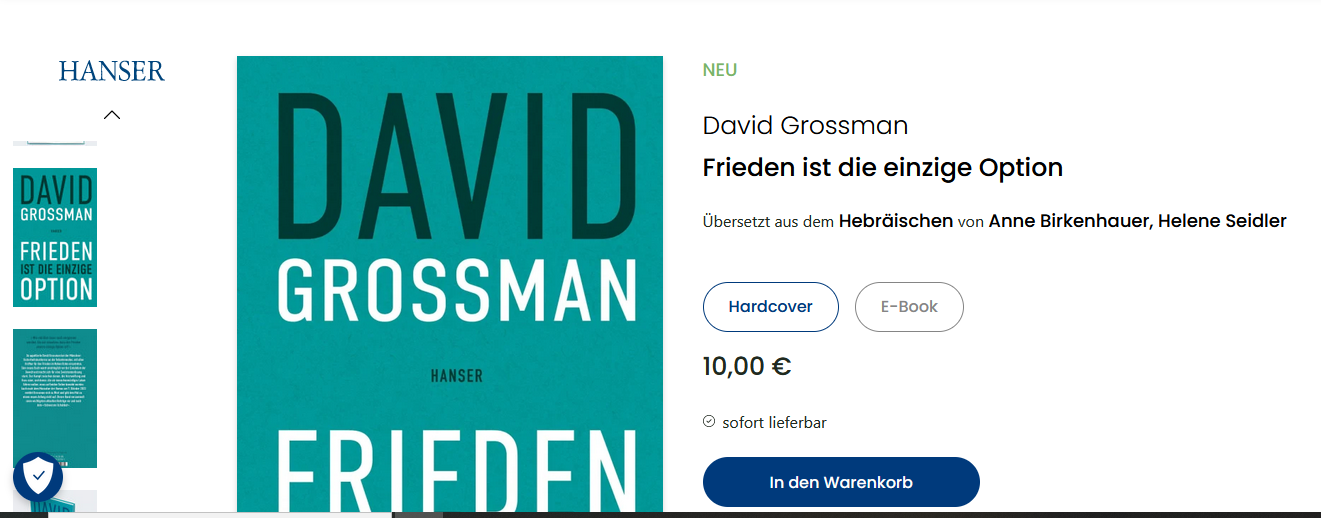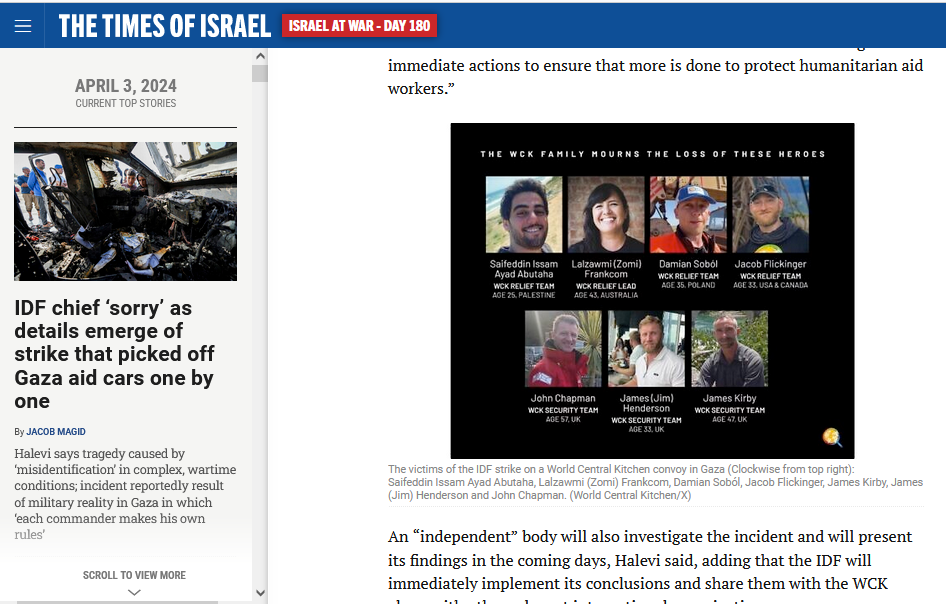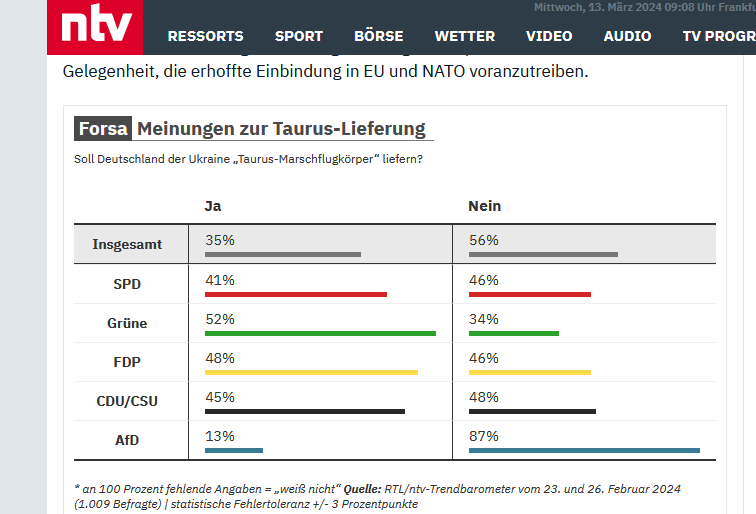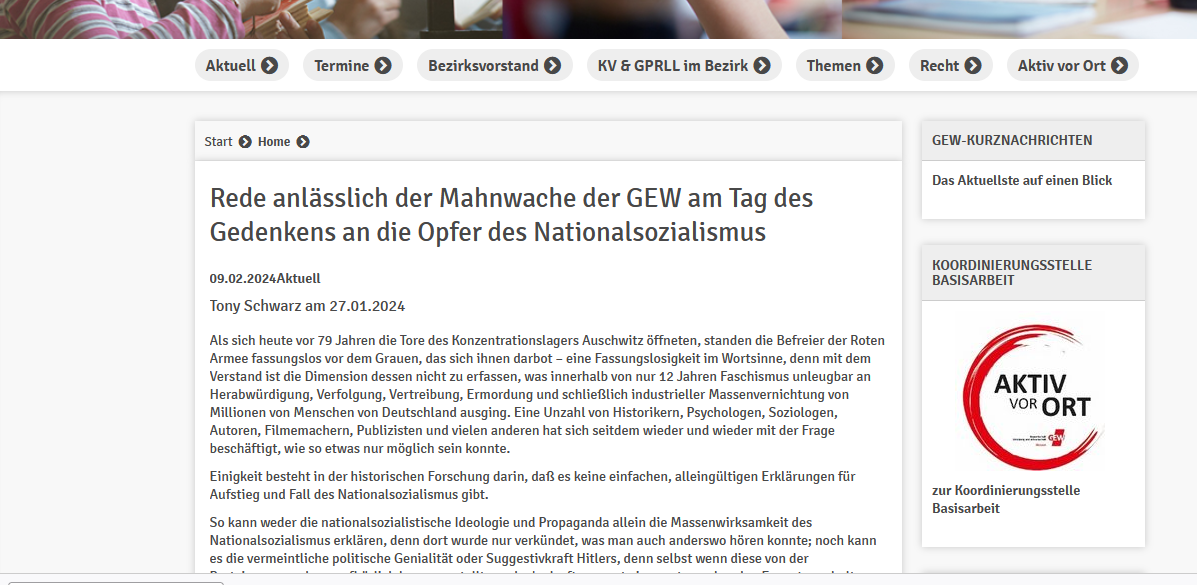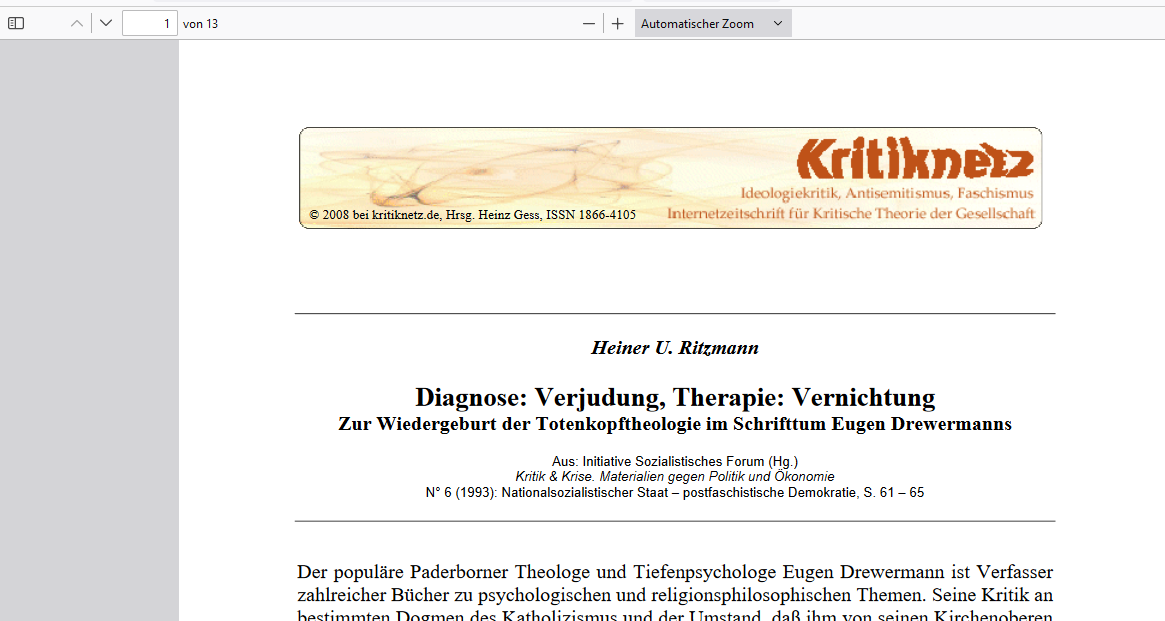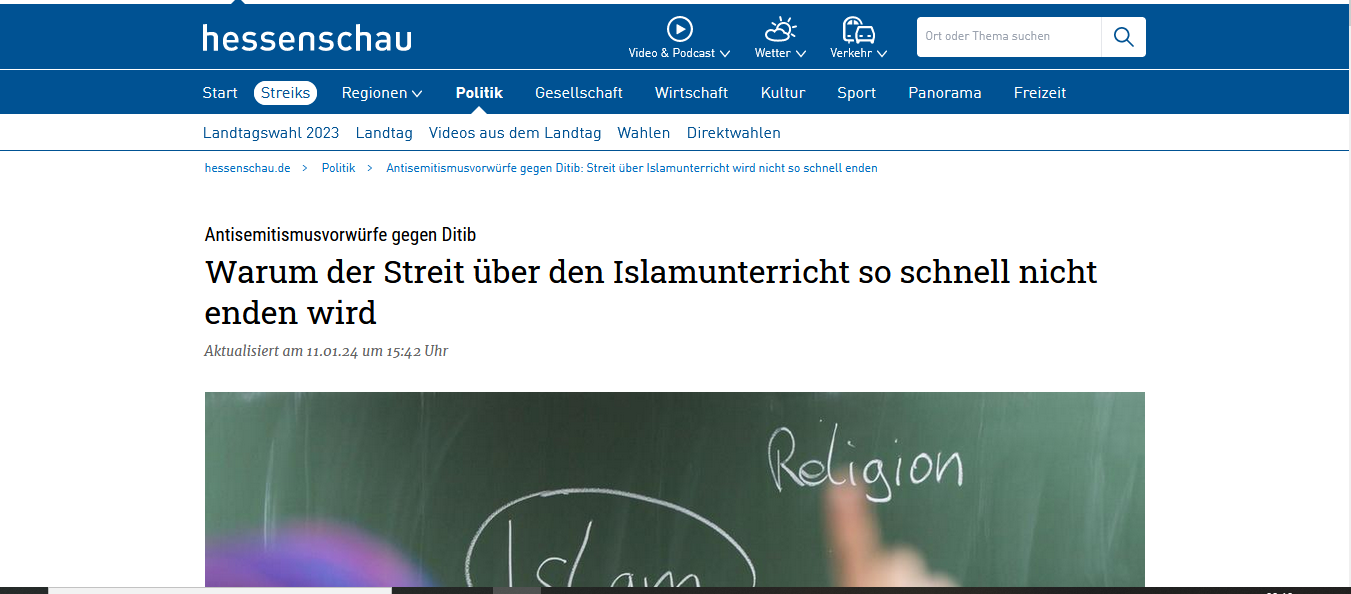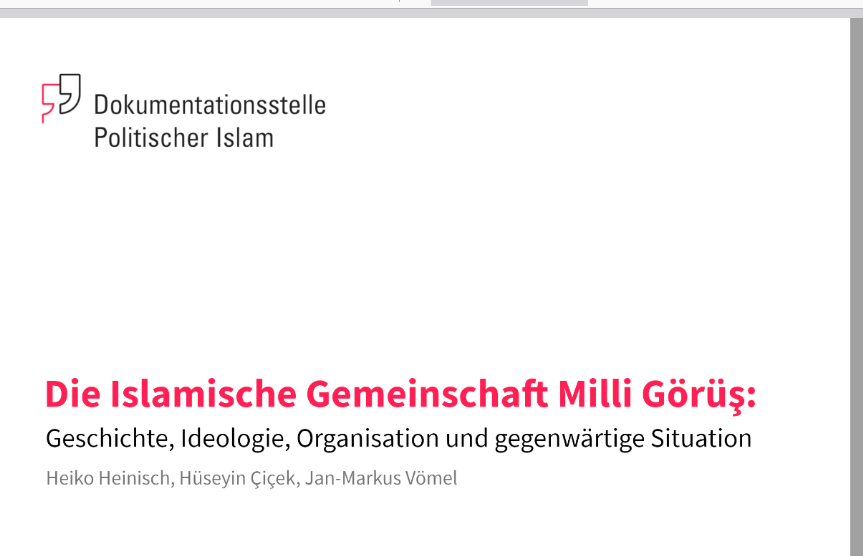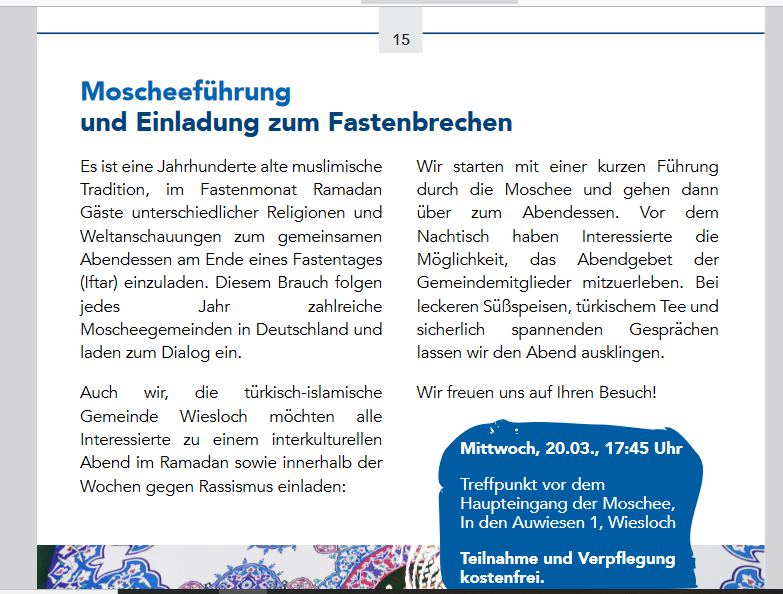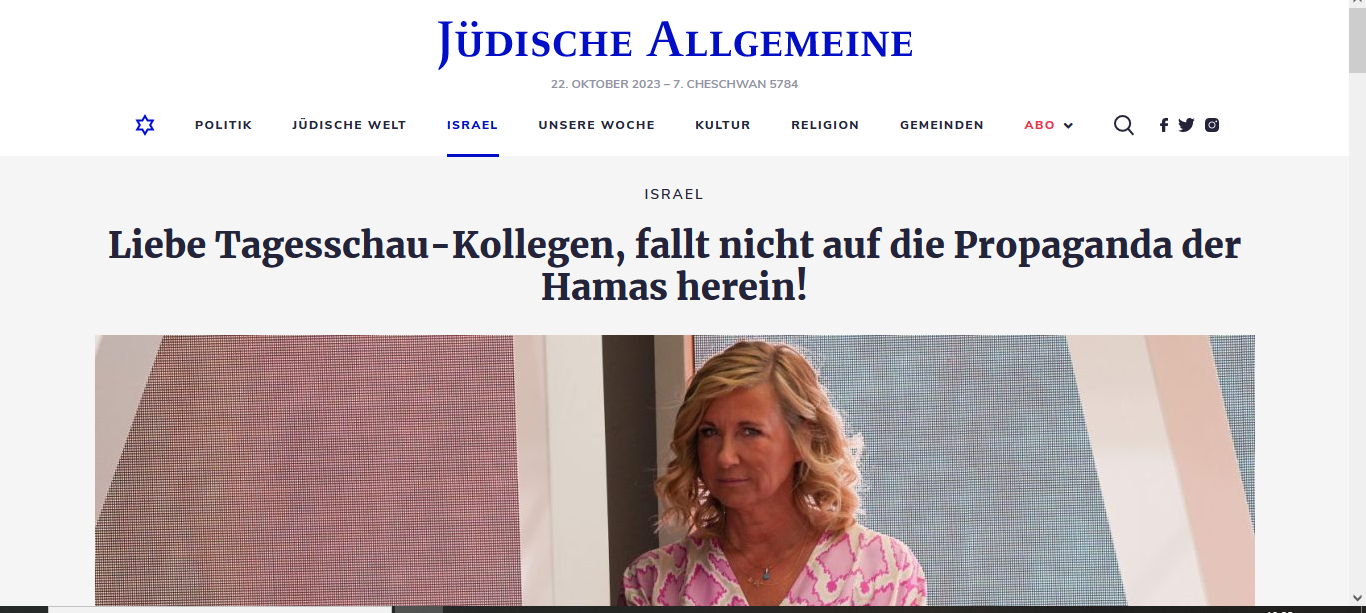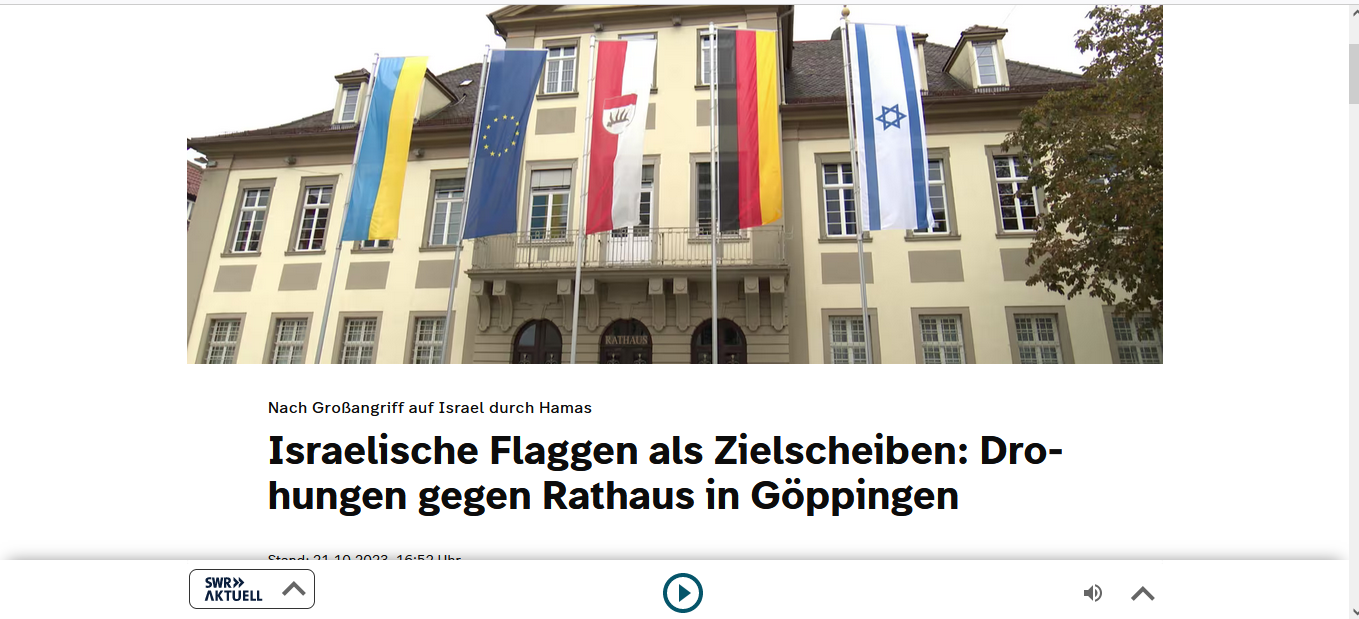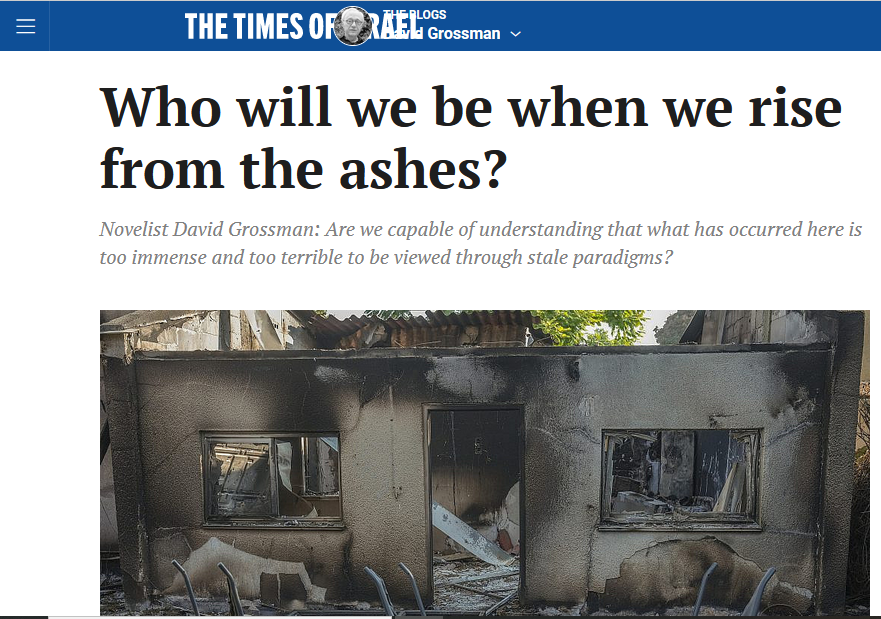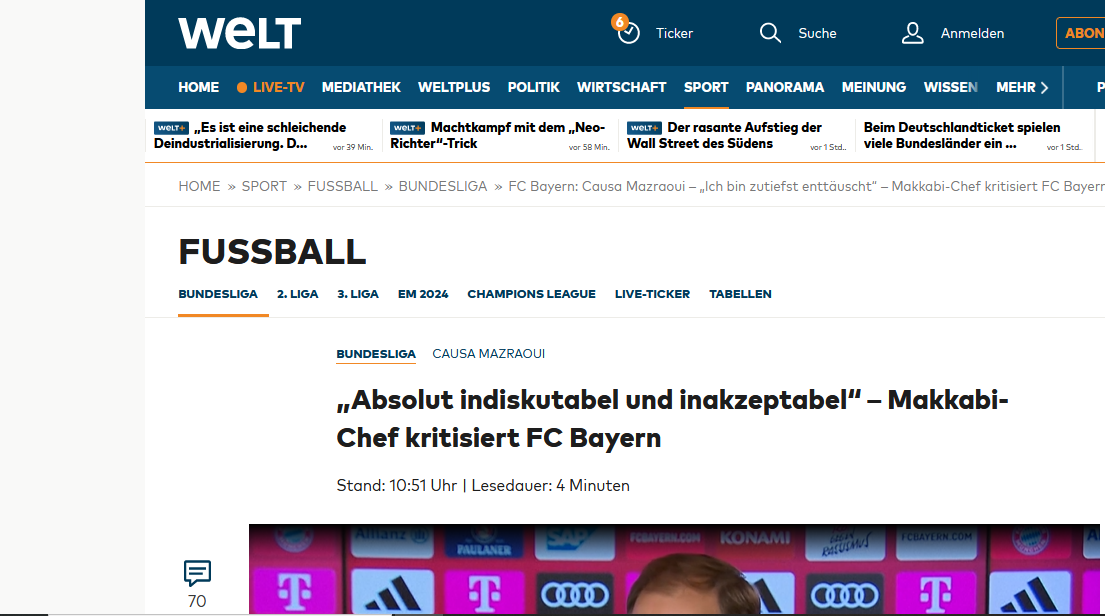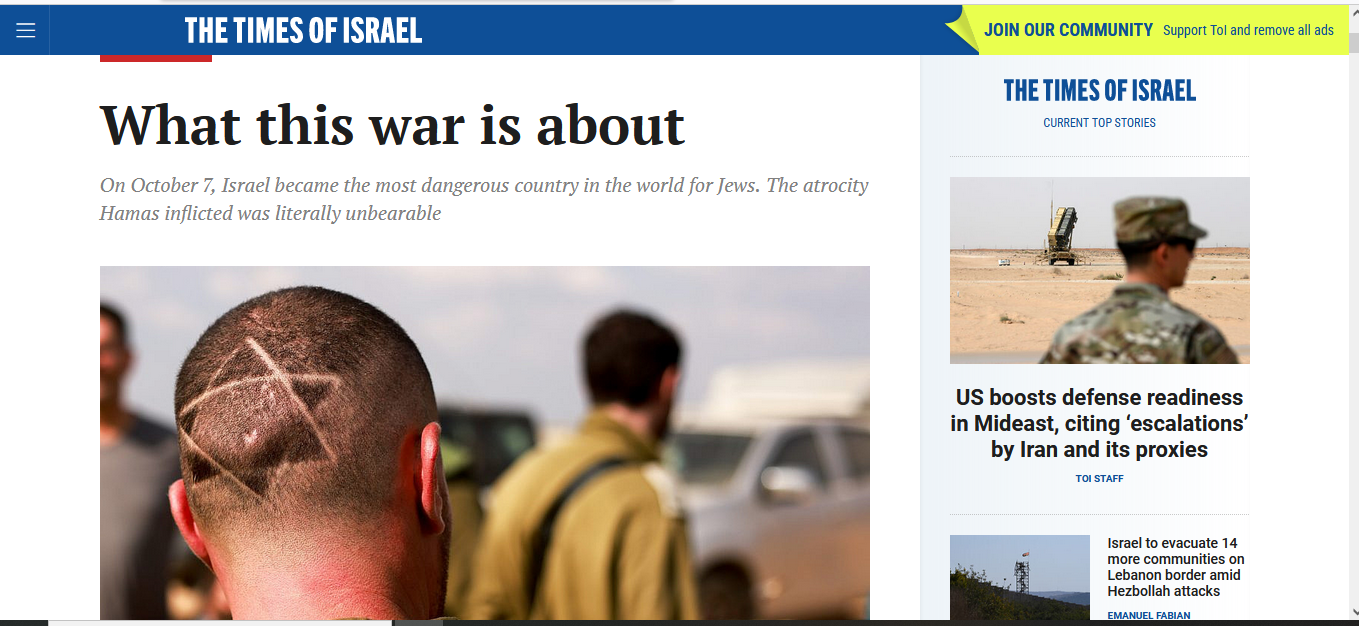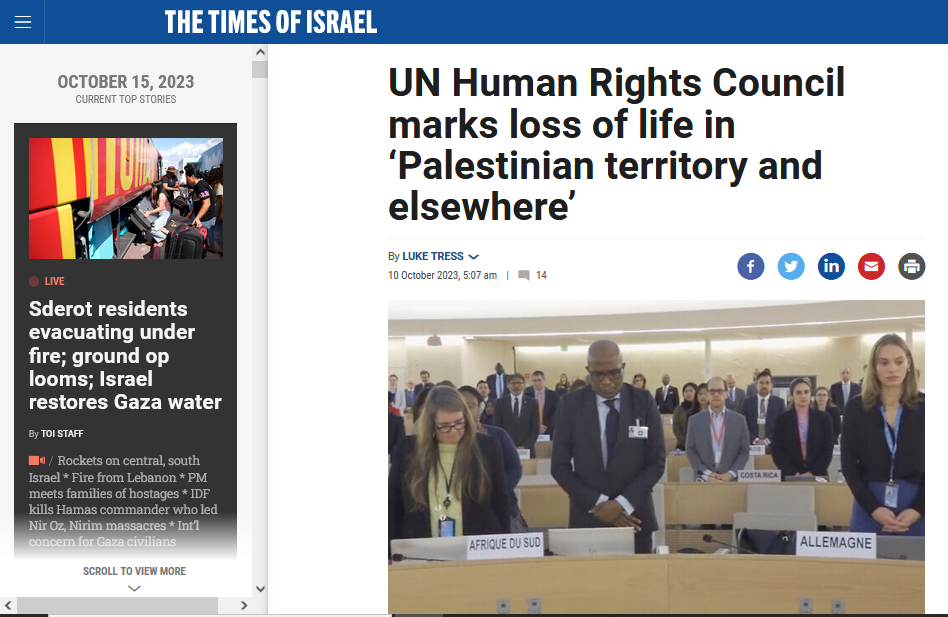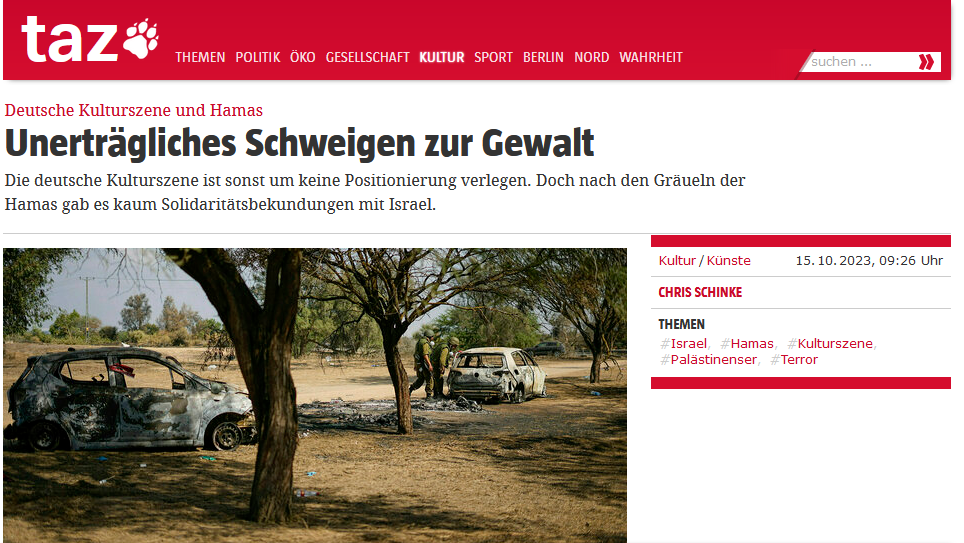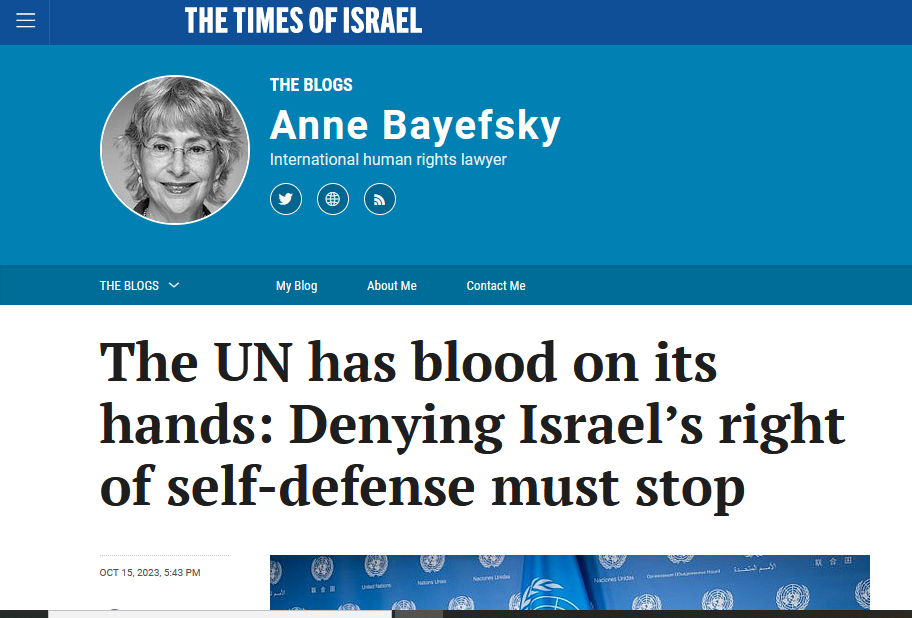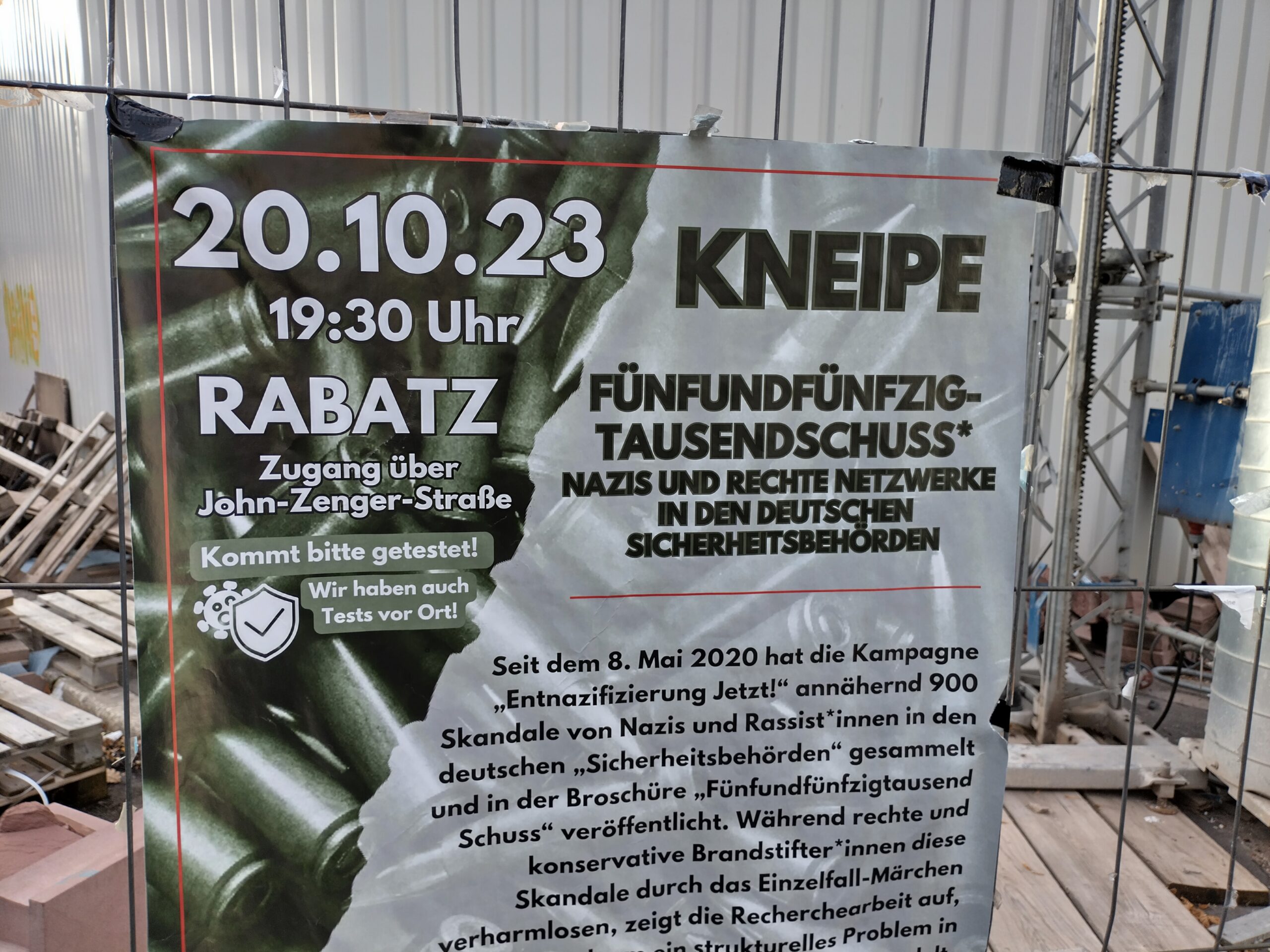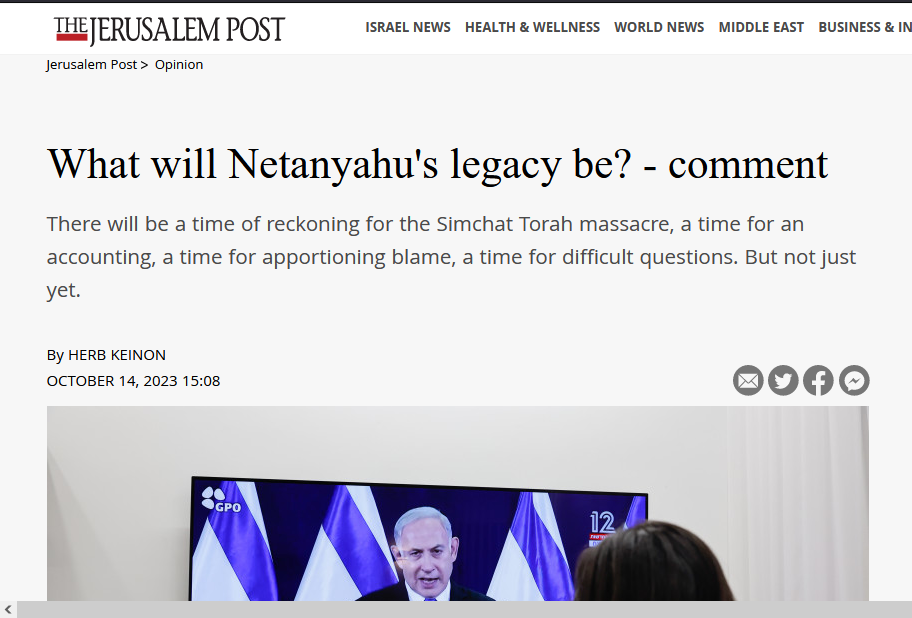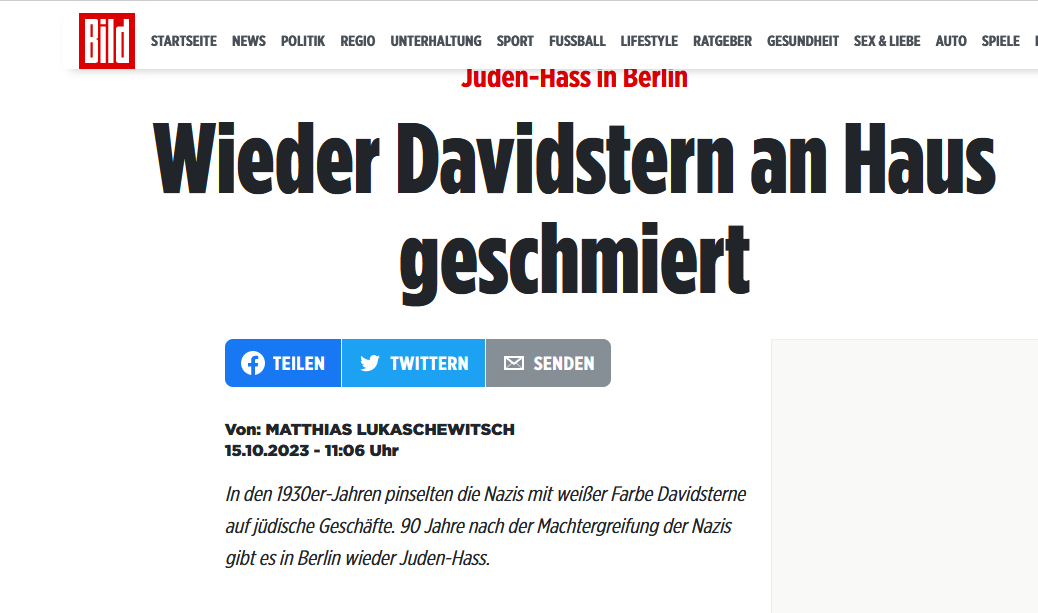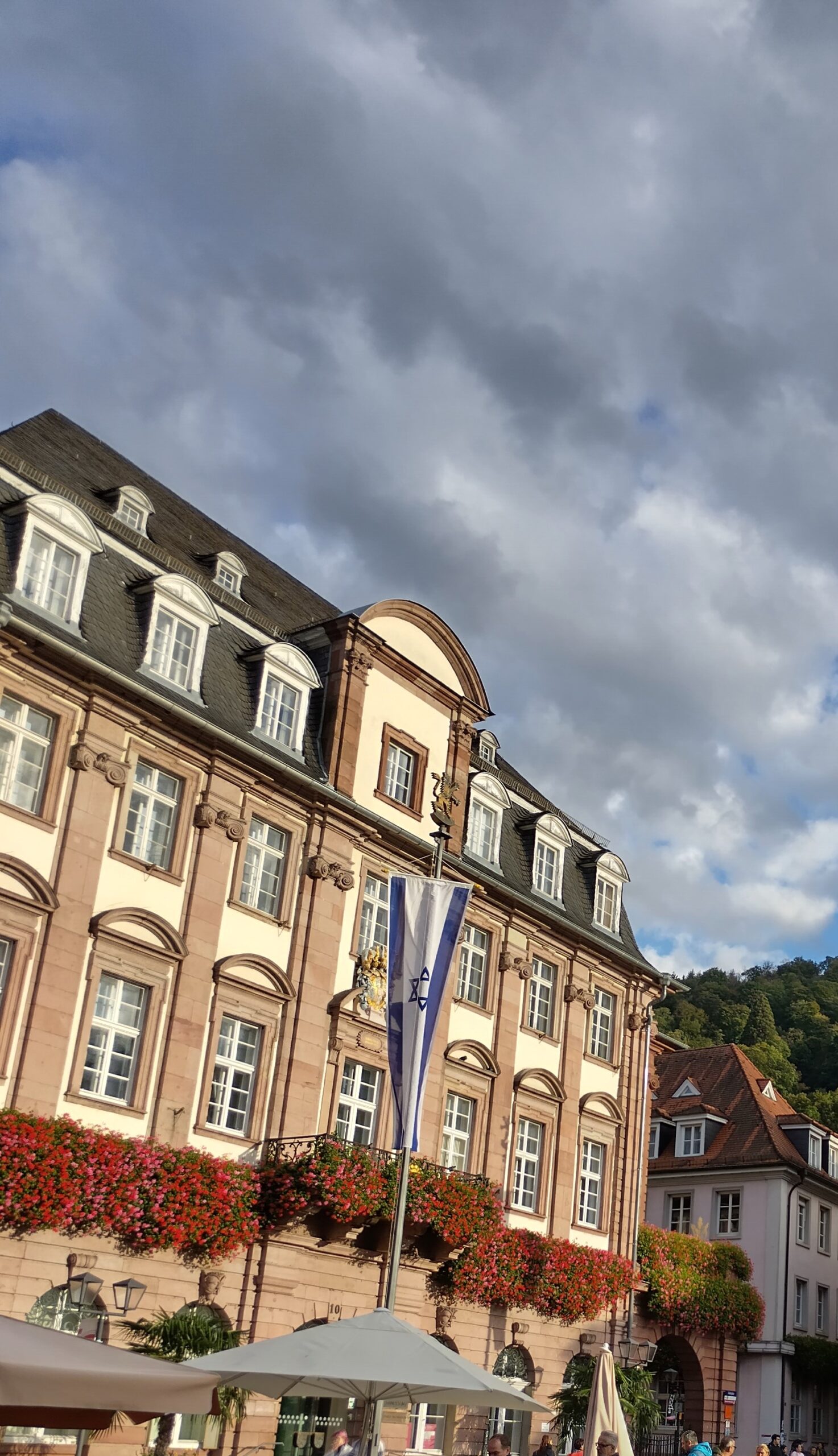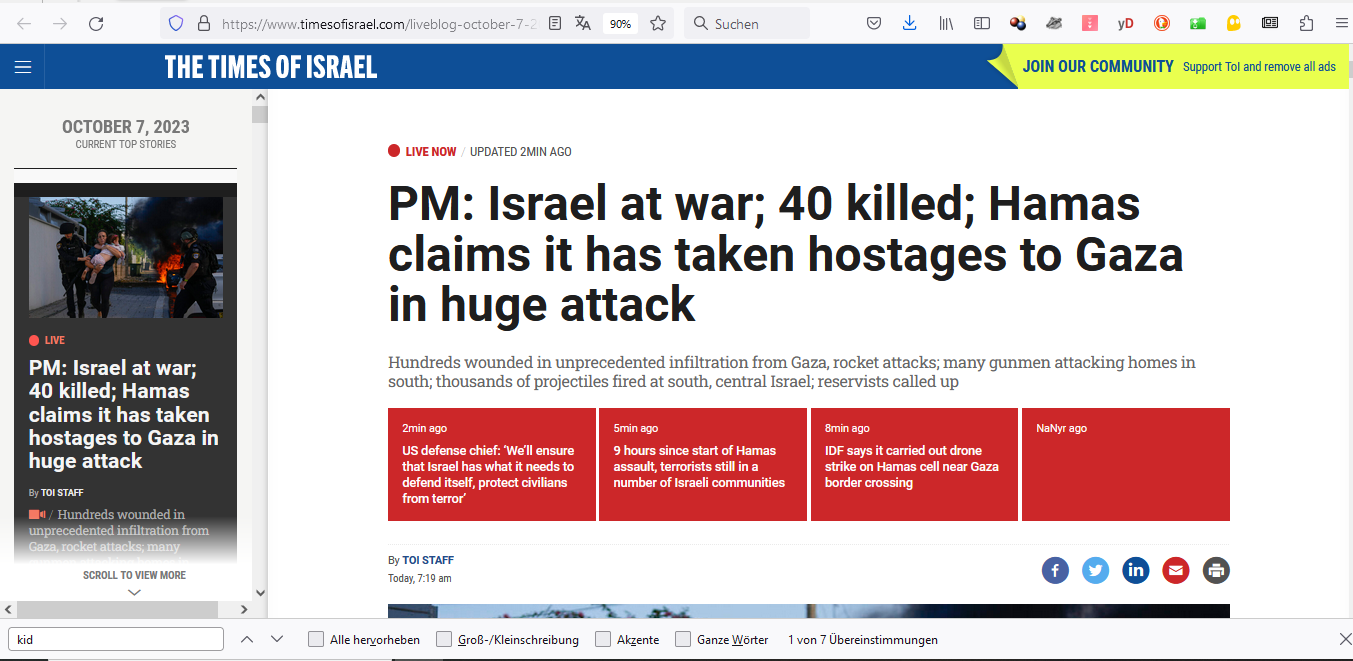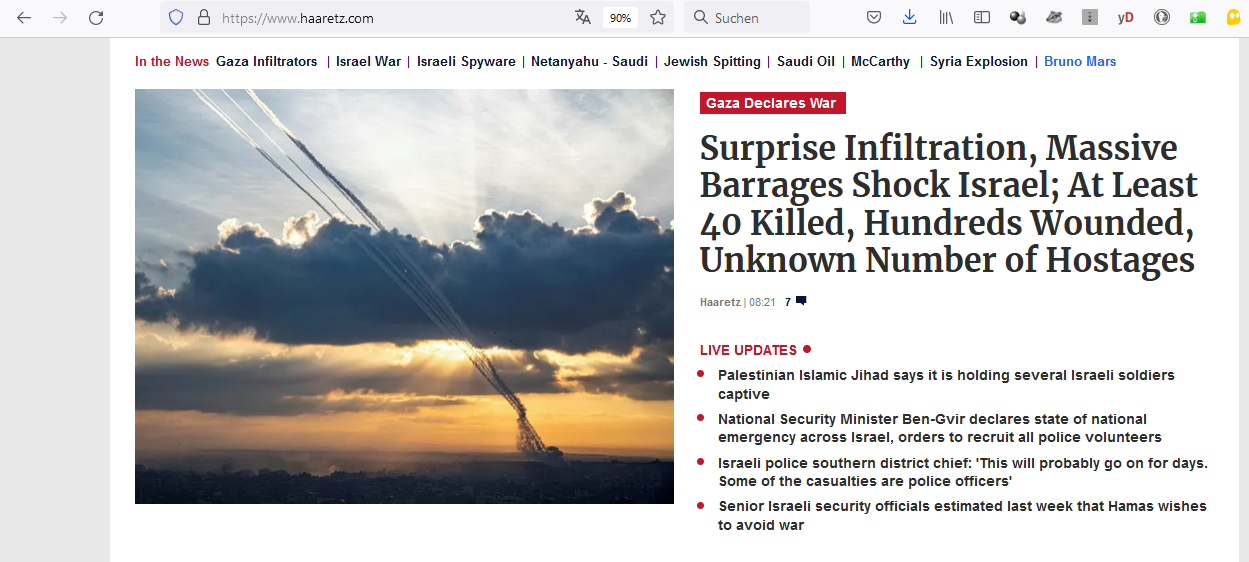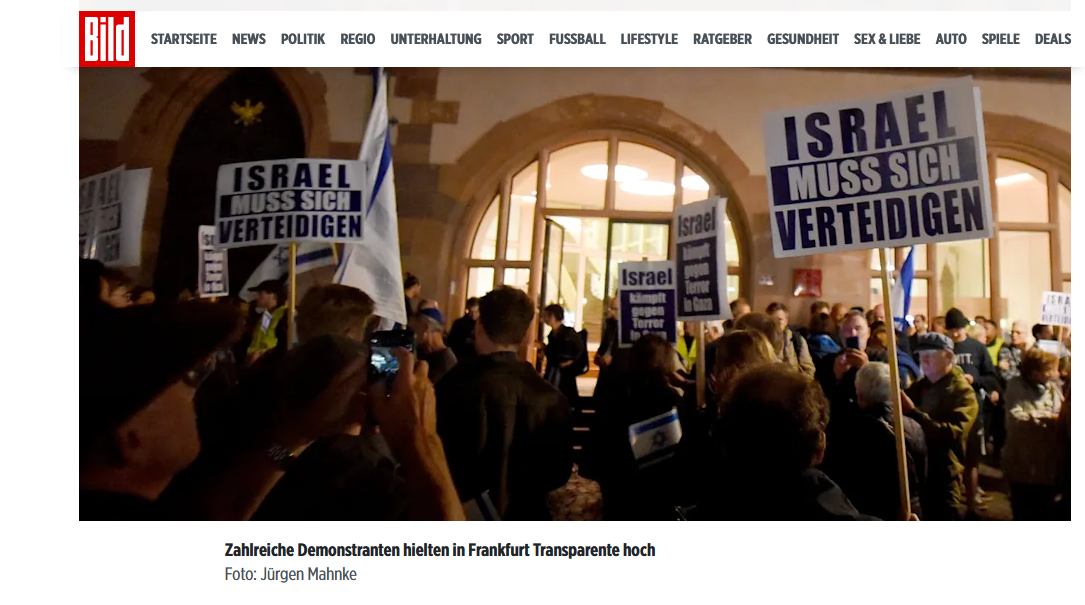Von Dr. phil. Clemens Heni, Direktor, The Berlin International Center for the Study of Antisemitism (BICSA)
Die Politikwissenschaftlerin Nancy Fraser hat am 1. November 2023 mit Hunderten weiteren Kolleginnen und Kollegen eine antisemitische Erklärung mit dem Titel „Philosophy for Palestine“ unterschrieben, deren zentraler Satz wie folgt lautet:
The blockade of Gaza has lasted 16 years; the occupation of the West Bank and Gaza has lasted 56 years; the dispossession of Palestinians of their lands and homes across historic Palestine has lasted three-quarters of a century, since the 1948 establishment of Israel as an ethno-supremacist state. It is not without reason that observers—including both international and Israeli human rights groups—now characterize Israel’s control over the land from the Jordan River to the Mediterranean Sea as a system of apartheid.
Damit wird Israel selbst die Schuld gegeben am schrecklichsten genozidalen Massaker an Juden seit der Shoah. Denn der Satz zuvor lautet:
Yet to act as though the history of violence began with Hamas’s attacks on October 7, 2023 is to display a reckless indifference to history as well as to both Palestinian and Israeli lives. In order for violence to stop, the conditions that produce violence must stop.
Die „Bedingungen“, die Gewalt „produzieren“ würden, seien also eine 16-jähriger Blockade des Gazastreifens, eine 56-jährige Besatzung des Westjordanlandes, die „Enteignung“ von palästinensischem Land seit 1948 und die Gründung Israels am 14. Mai 1948 sei ohnehin die Gründung eines „ethnisch-rassistischen Staates“ gewesen.
Damit leugnen diese Hunderten Forscher*innen die islamistische und muslimisch-antisemitische Dimension des Massakers vom 7. Oktober und geben den Opfern die Schuld.
Die „Bedingung“ für die genozidale Gewalt vom 7. Oktober 2023 ist islamistischer Antisemitismus und die seit 1947 andauernde palästinensische Verweigerung, einen jüdischen Staat Seite an Seite mit einem damals von den Vereinten Nationan avisierten arabischen Staat zu akzeptieren.
Die genozidale Ideologie der Muslimbruderschaft, deren Ableger Hamas seit 2007 den Gazastreifen regiert, ist der Grund für den 7. Oktober 2023.
Die Erklärung „Philosophy for Palestine“ hingegen ist eine ganz typische antisemitische Täter-Opfer Umkehr. Es ist die antizionistische Version der Holocaustleugnung.
Das Vergewaltigen und Abschlachten von jüdischen Frauen, das Händeabhacken von Kindern, das Ausstechen von Augen von Vätern vor den Augen der Kinder, das Herausschneiden von Föten von schwangeren Frauen, das Köpfen von Babies, das lebendige Verbrennen ganzer Familien, das in den Rücken stechen mit einem Messer, wenn eine jüdische Frau bei der Vergewaltigung durch palästinensisch-muslimische Mörder zurückzuckt, all das kommt hier nicht vor – drei Wochen nach dem 7. Oktober 2023. Diese Derealisierung ist der eigentliche Schock. Das Pamphlet redet von zivilen Opfern auf beiden Seiten, was die Sache noch schlimmer macht, weil sie eine militärische Reaktion Israels mit einem genozidalen Massaker auf eine Stufe stellt.
Umgehend nach dem Massaker, ja gleichzeitig wurden Süßigkeiten verteilt von den arabischen, palästinensischen, muslimischen und linken Freunden des Judenmordes, wie auf der Sonnenallee in Berlin-Neukölln.
Wo waren da die Stimmen der heutigen Kritischen Theoretiker*innen?
Dass darüber hinaus in einem Krieg wie im Gazakrieg Menschen sterben, ist traurig, aber nicht zu verhindern. Ja die Hamas tut alles dafür, dass möglichst viele Zivilist*innen sterben, während sie in den Tunneln sicher versteckt ihre Führungselite und Tausende Terroristen Kämpfer versteckt.
Das heißt nicht, dass Israel nicht auch Fehler begeht in diesem Krieg, militärische, strategische, taktische.
Erstmal hätten z.B. die Militärführung und die politische Führung umgehend nach dem 7. Oktober zurücktreten müssen, weil deren Verhalten vor dem 7. Oktober ja maßgeblich dazu beigetragen hatte, dass die Grenze zum Gazastreifen weniger gut geschützt war. Die Verlagerung von Truppen ins Westjordanland, um die von Netanyahu gehätschelten Siedler zu unterstützen, hatte dramatische Folgen. Das politische Klima in Israel war wegen der rechtsextremen Regierung unter Netanyhu und der geplanten und letztlich von den Hunderttausenden Demonstrant*innen und vom Obersten Gericht gestoppten Justizreform extrem aufgeladen, die Gesellschaft gespalten.
Der Kern des 7. Oktober 2023 aber ist ein anderer: Ohne den islamistischen und arabischen Judenhass der Hamas wäre es gar nicht zu dem Massaker gekommen. Dieser islamistische und in Teilen auch säkulare palästinensische Judenhass ist das Zentrum der Ideologie des palästinensischen Antizionismus. Nicht alle Palästinenser*innen sind antizionistisch und islamistisch, aber laut Umfragen doch die absolute Mehrheit:
Eine repräsentative Umfrage unter Palästinensern zeigt uns wie weit verbreitet der Antisemitismus unter den Palästinensern im Westjordanland wie im Gazastreifen ist: 75 Prozent begrüßen das schrecklichste Massaker seit dem Ende des Holocaust, das ihre islamistischen Schlächter am 07. Oktober 2023 im Süden Israels veranstalteten. Ebenfalls 75 Prozent stehen hinter der antisemitischen und antijüdischen Parole “from the river to the sea”, der die Auslöschung des jüdischen und demokratischen Staates Israel meint.
Diese Umfrage wurde am 14. November 2023 publiziert und hat mehr Realitätsbezug als die Agitation der „Philosophie für Palästina“.
Neben der antizionistischen Agitation fällt auch auf, dass die Autor*innen und Unterzeichner*innen wirklich einen vollkommenen Realitätsverlust haben, wenn sie behaupten, der ‚Westen‘ würde nur Israel unterstützen:
Most importantly, we are all too aware that the countries in which we live and work and to which we pay taxes is funding and abetting one party and one party only in this deeply asymmetric conflict. That party is not the oppressed, but the oppressor.
Das in seiner Struktur und Aufgabe ohnehin absurde palästinensische Flüchtlingshilfswerk UNRWA, das die Rückkehr der 1948 Vertriebenen fordert und damit nicht ’nur‘ die tatsächlich Vertriebenen meint (von denen ein paar Zehntausend noch leben), sondern Millionen von Nachkommen – so wie wenn Neonazis und Vertriebenenverbände bis heute fordern fordern würden, dass Millionen Deutsche ein Recht auf Rückkehr nach Polen oder Tschechien etc. hätten -, bekam allein im Jahr 2022 über eine Milliarde US-Dollar an Geldern von den USA, Europa und weiteren Ländern, wobei fast die Hälfte aus Europa kam, wovon wiederum Deutschland der Hauptgeldgeber ist:
In 2022, 44.3 per cent of the Agency’s total pledges of US$ 1.17 billion came from EU member states, who contributed US$ 520.3 million, including through the European Commission. The United States, Germany, the EU, and Sweden were the largest individual donors, contributing a cumulative 61.4 per cent of the Agency’s overall funding.
Dabei sind Tausende UNRWA Mitarbeiter*innen mit dem Islamismus, Antisemitismus und der Hamas eng verbunden, ja Teil des Terrornetzwerks und einige waren beim Abschlachten der Juden aktiv mit dabei, wie der Tagesspiegel und viele weiter Medien berichteten:
Das Verleugnen oder Affirmieren des Islamismus und palästinensischen Antisemitismus sind Kennzeichen dieses Antisemitismus der Erklärung „Philosophy for Palestine“.
Dass das Zentrum des arabisch-israelischen Konflikts die antisemitisch motivierte Weigerung der Araber war, im November 1947 dem UN-Teilungsplan für das britische Mandatsgebiet Palästina zuzustimmen, wird hier nicht erwähnt.
Selbstredend ist der Konflikt noch komplizierter, speziell die Besatzung des Westjordanlandes seit 1967 ist in Israel heftig umstritten – wobei die Besatzung durch Jordanien von 1948 bis 1967 keine internationale Kritik auslöste! -, aber wenn wir sehen, zu was die Palästinenser fähig sind und was ihre Motiviation ist – ein Genozid an den Juden – wird deutlich, dass Israel niemals eine Art Militär der Palästinenser im Westjordanland oder im Gazastreifen wird dulden können.
Antipalästinensischer wie antiarabischer Rassismus in Israel sind ein Problem, auf das viele Israelis seit Jahrzehnten hinweisen. Und doch haben die Araber in Israel gleiche Rechte wie das Wahlrecht.
Israel begeht keinen Genozid im Gazastreifen. Diese perfiden Vorwürfe von antisemitischen Regimen wie aus Südafrika oder Nicaragua sind nur wiederum beredter Ausdruck der Täter-Opfer Umkehr, einer Entwirklichung des tatsächlichen genozidalen Massakers, das die Hamas, der Islamische Jihad und die Palästinenser am 7. Oktober 2023 im Süden Israels begangen haben.
Dass die Araber 1967 versuchten, den jüdischen Staat ein weiteres Mal nach 1948 zu zerstören, und scheiterten, wird in „Philosophy for Palestine“ natürlich nicht erwähnt.
Die blutige Pointe ist, dass gerade jene pro-palästinensischen Jüdinnen und Juden im Süden Israels von der Hamas und den ganz normalen Palästinensern bestialisch abgeschlachtet wurden.
Eine Freundin erzählte mir von einer Verwandten aus Israel, die mit anderen Israelis immer im Herbst Palästinensern aus dem Gazastreifen bei der Olivenernte halfen, sie waren herzlich miteinander und freundschaftlich. Und jetzt wurde bekannt, dass einige dieser ganz normalen Palästinenser dabei eines der Kibbutzim, das jetzt am 7. Oktober angegriffen wurde, ausgespäht hatten.
Was soll man mit solchen Bestien aus Gaza in den nächsten Jahrzehnten tun?
Doch die Nancy Frasers dieser Welt sind eiskalte Israelfeinde. Das lebendige Verbrennen von Juden, das Massenvergewaltigen jüdischer Frauen oder das Entführen von Holocaustüberlebenden nach Gaza macht ihnen nichts aus, sonst hätten sie alle diese antisemitische Erklärung niemals geschrieben oder unterzeichnet.
Und deshalb ist es eine große Leistung, dass die Universität Köln diese Hetzerin Nancy Fraser nicht mit einer Gastprofessur ehren wird.
Am Rande gesagt, hat eine 76-jähriger Person das ohnehin nicht verdient, sie sollte Rentnerin sein und nicht jungen Forscher*innen die Jobs wegnehmen, aber das nur ganz am Rande.
Doch diese Eiseskälte dieser antisemitischen Hetzerinnen und Hetzer ist kennzeichnend für die Forscherin Nancy Fraser. Die Frankfurter Rundschau gibt Fraser reichlich Platz, um zu zeigen, dass sie überhaupt nicht verstanden hat, um was es geht: sie fordert einerseits in dem Offenen Brief der antisemitischen Philosophen (m/w/d) vom 1. November 2023 den Boykott aller wissenschaftlichen und ökonomischen etc. Beziehungen zu Israel, und andererseite leugnet sie mit diesem Brief die islamistische und muslimisch-antisemitische Motivation für das Abschlachten von 1200 Jüdinnen und Juden sowie das Entführen von über 250 Geiseln, von denen weiterhin ca. 100 im Gazastreifen gehalten werden.
Es sind Tausende Menschen im Gazastreifen im Krieg Israels gegen die Hamas ums Leben gekommen, aber nicht eine einzige Person wurde auf genozidale Weise massakriert oder zur Schau gestellt wie das mit den Opfern der palästinensische-muslimischen Mörder der Fall war, exemplarisch kann man das am Töten und Zurschaustellen von Shani Louk zeigen.
Die Palästinenser hatten seit dem Abzug Israels im Jahr 2005 die Möglichkeit, ein prosperierendes Palästina am Mittelmeer aufzubauen. Doch das wollten sie nicht, sie haben Hunderte Tunnel gegraben mit einer Länge von über 500 Kilometern, Waffen gehortet und seit Jahren Tausende Raketen auf Israel abgefeuert.
Das liegt daran, dass die Hamas und die sie unterstützende übergroße Mehrheit der Palästinenser*innen Antisemiten sind. Sie indoktrinieren die Kinder von kleinauf, Juden zu hassen. An einem Aufbau einer Zivilgesellschaft hatte die Hamas überhaupt kein Interesse. Anstatt Tunnel zu graben für ihre verkommenen Taten, hätten sie wirtschaftlich was aufbauen können, Landwirtschaft und Industrie plus Tourismus wären Ideen gewesen.
Aber religiöser Fanatismus lag dann doch näher – und das ist die lange Geschichte des palästinensischen Antisemitismus, der früher nicht palästinensisch hieß, weil zum Beispiel der Großmufti von Jerusalem und Nazi-Kollaborateur Haj Amin al-Husseini ein gewöhnlicher Araber und Antisemit war, doch zu seiner Zeit hießen auch die Juden „Palästinenser“, wie die Araber, die im Mandatsgebiet Palästina lebten. Erst seit den 1960er Jahren werden die Palästinenser „Palästinenser“ genannt.
Dass nun Dutzende Forscher*innen, von Hartmut Rosa über Seyla Benhabib, Axel Honneth, Rahel Jaeggi, Oliver Nachtwey, Sabine Hark, Andrea Maihofer, Hauke Brunkhorst, Alex Demirovic etc. pp., Nancy Fraser unterstützen – „Stellungnahme zur Ausladung von Nancy Fraser von der Albertus Magnus Professur an der Universität zu Köln, 5. April 2024“ -, wundert überhaupt nicht.
Auch Omri Boehm ist mit dabei bei den Nancy-Fraser-Fans, Boehm ist ein universalistischer antizionistscher Autor, wie die Jüdische Allgemeine schon 2015 festhielt, darum ist er wohl in Deutschland oder beim Schriftsteller Daniel Kehlmann, mit dem er jüngst zwei Tage lang über Kant plauderte, besonders beliebt:
Ohne es gewollt zu haben, gelingt Omri Boehm in seiner wütenden Philippika gegen Leute, die den jüdischen Staat nicht verurteilen möchten, doch noch ein bedeutendes Argument gegen Antisemitismus: Es gibt auch dumme jüdische Philosophen.
Gerade Leute, die vorgeben, sich mit der Kritischen Theorie auszukennen, wären eigentlich prädestiniert dafür, Israel zu unterstützen. Aber das Gegenteil ist der Fall.
Das liegt daran, dass kaum jemand die Quellen liest oder kennt, wenn es um die Kritische Theorie von Horkheimer und Adorno und deren Verhältnis zu Israel geht.
Die Kritische Theorie war pro-israelisch, das zeigen die Quellen, die ich in meiner Studie „Kritische Theorie und Israel“ ausgebreitet habe.
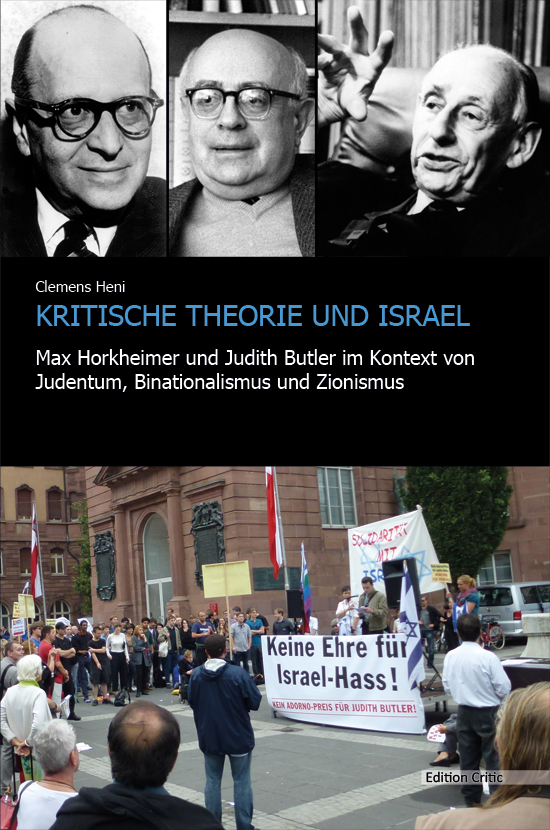
Doch diese Grundlagenforschung wird von den üblichen Verdächtigen und Suhrkamp-Autor*innen logisch ignoriert, weil das nicht ins Bild passt, links und pro-israelisch. Auch die Konservativen oder Liberalen machen sich diese Mühe nicht, sie sehen ihr Vorurteil bestätigt, dass links gleich antisemitisch ist.
Für die Universität Köln jedoch ist folgender Boykottaufruf gegen den jüdischen Staat der zentrale Punkt, warum Nancy Fraser ganz sicher nicht mit einer Gastprofessur geehrt werden wird:
We invite our fellow philosophers to join us in solidarity with Palestine and the struggle against apartheid and occupation.In particular, join us in supporting the academic and cultural boycott of Israeli institutions—distinct from individuals—as outlined by the Palestinian Campaign for the Academic and Cultural Boycott of Israel (PACBI). We urge all individuals to speak out openly and fearlessly, and work to advance the cause of Palestinian liberation and justice for all.
Die Aggressivität, mit der jetzt die akademische Elite sich hinter diesen Antisemitismus und Nancy Fraser stellt, ist bezeichnend, nicht überraschend, aber typisch. Schon bei der skandalösen Verleihung des Adorno-Preises an die antisemitische Agitatorin Judith Butler im Jahr 2012 zeigte sich, dass die wissenschaftliche Elite Israelhass ehrt. Damals schon wurde das am Beispiel des damaligen Leiters des Instituts für Sozialforschung Axel Honneth deutlich. Er ist auch jetzt wieder dabei und unterstützt Fraser, ohne mit einem Wort den genozidalen Judenhass der Hamas zu verurteilen in dem offenen Brief, den er mit Dutzenden Gleichgesinnten publiziert hat.
Mit dabei ist auch einer der besonders aggressiven Verteidiger der irrationalen, medizinisch nicht evidenzbasierten und antidemokratischen Coronapolitik, Oliver Nachtwey aus Basel in der Schweiz. Nachtwey hat Antisemitismus in der Szene der Kritiker*innen der Coronapolitik gesehen (dazu gibt es ein ganzes Kapitel in dem Band Pandemic Turn) – als Beispiel würde ich anführen, dass Judensterne mit der Inschrift „ungeimpft“ widerliche Formen des Antisemitismus und der Holocaustverharmlosung sind -, aber unterstützt jetzt die Israelfeindin Nancy Fraser. Es gab zudem auf Anti-Coronapolitik-Demos auch Israelfahnen wie in Berlin oder Kassel.
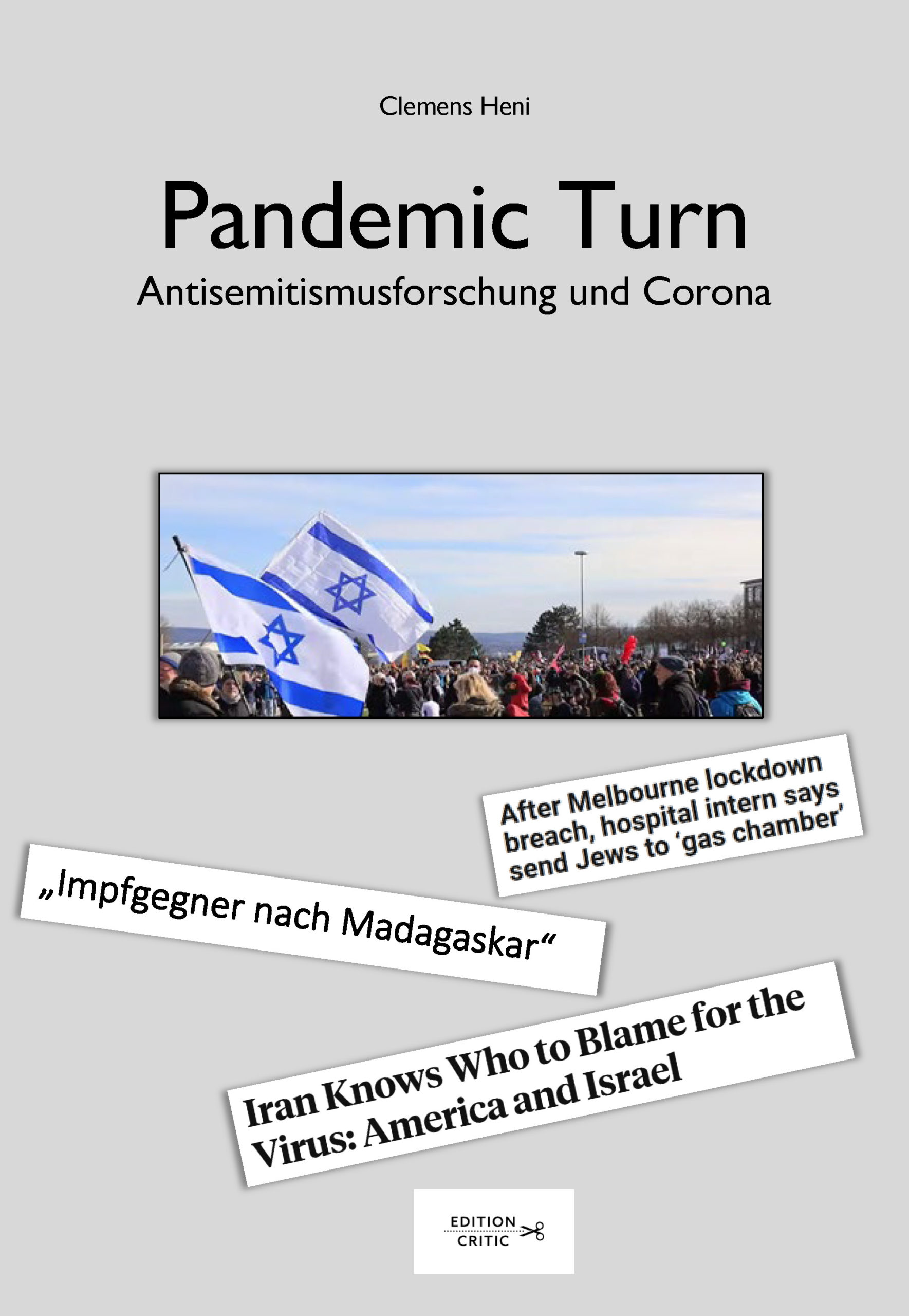
Wer hat jetzt eine „relative Neigung zum Antisemitismus„, wie Nachtwey noch angesichts der Coronapolitik-Protestbewegung schrieb, aber jetzt selbst Antizionismus nicht sehen will oder kann oder unterstützt?
Der Fall Nancy Fraser ist ein Lehrstück über akademischen Antisemitismus. Antizionismus ist in diesen Kreisen ein Glaubensbekenntnis, mal offener, mal gewundener, aber immer mit der gleichen Intention: den jüdischen Staat zu schwächen, zu diffamieren und seine Feinde zu tätscheln oder deren genozidales Morden zu derealisieren.
Adorno, Horkheimer, Löwentahl und Marcuse, die Israelfreunde, die angesichts der genozidalen Drohungen der Araber 1947/48, in den 1950er Jahren oder 1967 und in den 1970er Jahren sich hinter den Judenstaat stellten, wären fassungslos, wenn sie wüssten, was im Namen der Kritischen Theorie heute alles möglich ist.
Denn aus der pro-israelischen und antisemitismuskritischen ursprünglichen Kritischen Theorie ist eine Ansammlung von Agitator*innen geworden, deren vorderstes Ziel es zu sein scheint, Juden zu zeigen, wie vollkommen egal es ihnen ist, dass die Hamas alle Juden – alle! – vernichten will, und 1200 von ihnen schon massakriert hat, und ca. 100 noch in der Folter-Geiselhaft sich befinden.
Schon 2014 habe ich in meiner Studie „Kritische Theorie und Israel“ typische Autoren und Autorinnen aus dem heutigen Spektrum der Kritischen Theorie kritisch unter die Lupe genommen:
Gerhard Vinnai schreibt in der Zeitschrift für kritische Theorie[1] über die gegenwärtige amerikanische Gesellschaft und „vielfältige narzisstische Kränkungen“[2] – die „narzisstische Kränkung“ ist eine typische Begrifflichkeit der Kritischen Theorie und zeugt von der Verbindung von Marxismus und Psychoanalyse. Er setzt Kapitalismus und Gewalt allerdings gerade nach dem 11. September 2001 in Beziehung. Vom Jihad schweigt er. Angesichts des islamistisch, antisemitisch und antiamerikanisch motivierten Massenmords vom „sozialen Tod in der Konkurrenzgesellschaft“[3] zu reden, zeigt das Derealisierungspotential von nicht geringen Teilen heutiger Kritischer Theorie, die sich dem spezifischen Problem des Islamismus, Antisemitismus und Antiamerikanismus bzw. der antiwestlichen Ideologie oft verschließt und lieber selbst alten antiamerikanischen Ressentiments frönt.
[1] Gerhard Vinnai (2006): Der Drang zur Gewalt – Zur Sozialpsychologie von Kriegsbereitschaft und Terrorismus, Zeitschrift für kritische Theorie, Heft 22–23/
2006, 7–27.[2] Vinnai 2006, 26.
[3] Vinnai 2006, 26.
Weiter:
Heutzutage stellt sich eine Kompanie Kritischer Theoretiker hinter die Israelgegnerin Judith Butler, als diese sich Kritik an der Vergabe des Adorno-Preises im Jahr 2012 gegenübersah, wie vom Zentralrat der Juden in Deutschland.[1] Unter den Anhängern Butlers sind Nancy Fraser, Diedrich Diederichsen, Micha Brumlik, Hauke Brunkhorst, Alex Demirović, Albrecht Wellmer, Seyla Benhabib und Idith Zertal.[2] Axel Honneth war, wie bereits erwähnt, als Leiter des Instituts für Sozialforschung in Frankfurt gar Teil des Gremiums, welches Butler zur Preisträgerin kürte.[3]
[1] Stephan J. Kramer (2012): So werden Israels Todfeinde legitimiert. Warum Professorin Judith Butler keinen Adorno-Preis verdient. Eine Antwort auf Judith Butlers Aufsatz, Frankfurter Rundschau, 6. September 2012, http://www.zentralratdjuden.de/de/article/3798.so-werden-israels-todfeinde-legitimiert.html (eingesehen am 11. März 2014).
[2] „Zum Adorno-Preis an Judith Butler – Unterstützungserklärung,“ 3. September 2012, http://www2.gender.hu-berlin.de/ztg-blog/2012/09/adorno-preis-fur-judith-butler-unterstutzungserklarung/ (eingesehen am 6. Januar 2014).
[3] http://www.kulturpreise.de/web/preise_info.php?preisd_id=495 (eingesehen am 9. März 2014).
Weiterhin analysiere ich zum Beispiel einen der frühen und international bedeutenden Chronisten und Geschichtsschreiber der Kritischen Theorie, Martin Jay:
2010 war Jay im akademischen Komitee, welches die Doktorarbeit von Asaf Kedar annahm, worin es um die deutsche Ideologie eines „nationalen Sozialismus“ vor dem Nationalsozialismus, zur Zeit des Kaiserreichs geht, National Socialism Before Nazism: Friedrich Naumann and Theodor Fritsch, 1890–1914.[1] Kedar setzt den frühen Zionismus mit national-sozialistischen Ideologiefragmenten in eins und erwähnt auf der gleichen Seite Hitler, um auf herbei fantasierte Kontinuitätslinien von prä-nazistischem deutschem nationalem Sozialismus und prä-israelischem nationalem Sozialismus in Israel abzuheben.[2] Kedar arbeitet für eine antiisraelische NGO in Israel, Zochrot.[3] Diese NGO erhielt schon Gelder aus Deutschland.[4] Der Name Asaf Kedars findet sich schließlich auf einer Unterschriftenliste der BDS-Kampagne zum Boykott Israels.[5]
Mehr noch: Martin Jay geht in einem Text in der Zeitschrift Salmagundi im Jahr 2003 so weit, Juden bzw. Israeli wie Ariel Scharon (1928–2014) für das Wiedererstarken des Antisemitismus seit der Zweiten Intifada im September 2000 verantwortlich zu machen.[6] Er behauptet, jeder Ansatz, „der Antisemitismus untersuche und nicht in Betracht ziehe, dass die Opfer ihren Anteil daran haben“, könne „historisch nicht überzeugend sein“.[7] Damit stellt Jay die Antisemitismusforschung auf den Kopf. Es wäre interessant von dem Kritischen Theoretiker zu erfahren, zu welchen Teilen Juden mitverantwortlich für Antisemitismus gemacht werden können, hinsichtlich folgender Beispiele: Weltverschwörung, Beherrschung von Medien, Banken und Kultur, mittelalterliche und heute gerade in muslimischen Länden wieder belebte Blutbeschuldigung oder Brunnenvergiftung bzw. Vergiftung von Süßigkeiten durch Israeli.
[1] Asaf Kedar (2010): National Socialism Before Nazism: Friedrich Naumann and Theodor Fritsch, 1890-1914, online publizierte Dissertation, http://www.escholars
hip.org/uc/item/7bt808vx (eingesehen am 6. Januar 2014). Der Doktorvater an der University of California, Berkeley, war Mark Bevir, neben Jay saß Wendy Brown im Komitee.[2] „Another case of national socialism underpinning a nation-building project, that of the pre-state Zionist labor party, was animated by a similar exclusionary drive, directed primarily against the indigenous Palestinian population as well as against transnational class consciousness. See Sternhell, The Founding Myths of Israel“, Kedar 2010, 171, Anm. 75.
[3] Zochrot wurde vom Politikwissenschaftler Gerald Steinberg und von NGO Monitor kritisiert, http://www.ngo-monitor.org/article/zochrot (eingesehen am 27.01.
2014).[4] http://www.medico.de/themen/menschenrechte/nahost/dokumente/zochrot/
93/ (eingesehen am 27.01.2014).[5] http://www.ijsn.net/petition/signatures/bds_not_antisemitic/657 (eingesehen am 27.01.2014).
[6] Martin Jay (2003): Ariel Sharon and the Rise of the New Anti-Semitism, Salmagundi, Winter 2003, Nr. 137/138, 12–29.
[7] Jay 2003, 17, Übersetzung d.V.
Hierbei geht es auch um den zumal in Deutschland zu Lebzeiten sehr beliebten Historiker Tony Judt:
2006 unterzeichnete Jay zusammen mit Judith Butler, Steven Beller, Neve Gordon und einer großen Zahl weiterer Kolleginnen und Kollegen eine Solidaritätserklärung für den antizionistischen Historiker Tony Judt sowie für die Politologen Stephen Walt und John J. Mearsheimer.[1] Judt wird als Kritiker des „ethnischen Nationalismus“ Israels vorgestellt. Judt (1948–2010) war in der Tat eine der lautesten Stimmen gegen Israel und ein Vertreter der binationalen Idee.[2] [Der berühmte Historiker und zu Lebzeiten führende Antisemitismusforscher unserer Zeit, Prof. Robert] Wistrich wirft ihm 2010 zu Recht die „Rationalisierung von Terrorismus, die Trivialisierung des Antisemitismus und die Dämonisierung Israels“ vor.[3]
[1] „A Statement in Support of Open and Free Discussion about U.S. and Israeli Foreign Policy and Against Suppression of Speech“, ohne Datum (wohl Oktober 2006), http://www.archipelago.org/vol10-12/freespeech.htm (eingesehen am 4. Februar 2014).
[2] Tony Judt (2003): Israel: The Alternative, 23. Oktober 2003, http://www.nybooks
.com/articles/archives/2003/oct/23/israel-the-alternative/ (eingesehen am 4. Februar 2014).[3] Robert S. Wistrich (2010): A Lethal Obsession. Antisemitism from Antiquity to the Global Jihad, New York: Random House, 541. Weitere Kritik an Tony Judt bei Anthony Julius (2010): Trials of the Diaspora. A History of Anti-Semitism in England, Oxford/New York: Oxford University Press, 557, Alvin Rosenfeld (2006): Progressive Jewish Thought and the New Antisemitism, New York: American Jewish Committee (AJC), http://www.ajc.org/atf/cf/%7B42D75369-D582-4380-8395-D25925B85EAF%7D/PROGRESSIVE_JEWISH_THOUGHT.PDF (eingesehen am 29.01.2014)2006, 15–16, Manfred Gerstenfeld (2005): Jews against Israel, Nativ, 8. Jg., Oktober 2005, http://www.acpr.org.il/English-Nativ/08-issue/gerstenfeld-8.htm (eingesehen am 23. Mai 2012), Clemens Heni (2013): Antisemitism: A Specific Phenomenon. Holocaust Trivialization – Islamism – Post-colonial and Cosmopolitan anti-Zionism, Berlin: Edition Critic, 256–260.
Speziell das Großthema Islamismus und Jihad ist für die meisten selbst ernannten heutigen Kritischen Theoretiker*innen kein Thema, wie ich 2014 feststellte:
Dieselbe Zeitschrift für kritische Theorie publizierte noch weitere Texte gegen den amerikanischen War on Terror unter dem US-Präsidenten George W. Bush, wie einen Artikel des Kritischen Theoretikers und Mit-Herausgebers der Gesammelten Schriften von Max Horkheimer, Gunzelin Schmid Noerr.[1] Texte, die sich aus kritisch-theoretischer Perspektive mit Islamismus, Jihad oder linkem Antizionismus befassen, findet man dagegen in der Zeitschrift für kritische Theorie nicht, dafür Texte des Nichtzionisten Moshe Zuckermann.[2]
[1] Gunzelin Schmid Noerr (2009): Zur Funktion politisch bekundeter Moral. Ethische und psychoanalytische Studien zu Person und Wirkung George W. Bushs, Zeitschrift für kritische Theorie, Heft 28–29/2009, 218–232.
[2] Moshe Zuckermann (2009): Die Persistenz von Ideologie. Anmerkungen zu Wagner, Israel und den Wonnen der Ignoranz, Zeitschrift für kritische Theorie, Heft 28–29/2009, 117–128.
Hingegen waren die Kritischen Theoretiker schon in den 1950er Jahren hellwach, namentlich der erste jüdische Rektor einer Universität in der BRD, Max Horkheimer, Leiter des Instituts für Sozialforschung:
„Die negativen, negativistischen Geister, die nur sehen und sagen, was das Grauen ist, was nicht sein soll, die Gott zu nennen sich scheuen, was wollen sie? – Daß es gut wird. Die Positiven handeln in seinem Namen, sie bejahen die Welt und ihren Schöpfer. Sie einigen sich – sind nicht gegen die heiligen Güter. Sie führen sie im Mund. So einigte Hitler die Deutschen, indem er die Juden als Opfer designierte, Nasser die Araber, indem er Israel als Opfer designiert.“[1]
Horkheimer hat somit Mitte der 1950er Jahre den arabischen Antisemitismus am Beispiel Ägyptens und Nassers klar erkannt und stellte sich schon damals hinter den Judenstaat. Nur wenige Jahre nach der Shoah sah Horkheimer das Fortleben des auf Vernichtung der Juden gerichteten Antisemitismus.
[1] Max Horkheimer (1991): Gesammelte Schriften, Band 6: ‚Zur Kritik der instrumentellen Vernunft‘ und ‚Notizen 1949 – 1969‘. Herausgegeben von Alfred Schmidt, Frankfurt am Main: S. Fischer, 240.
Am 5. Dezember 1967 schreibt Theodor W. Adorno in einem Geburtstagsgruß an Gershom Scholem:
„Scholems würdig ist die Paradoxie seiner Wirkung: heute, da er siebzig Jahre als wird, hat der Ordinarius der Universität Jerusalem bei allen Menschen, denen nicht nur am Geist des Judentums sondern am Überleben der Juden selbst etwas gelegen ist, die Autorität des Weisen gewonnen. Großartig widerspricht sie dem antiautoritären Zug seines Lebens und des von ihm Interpretierten. Seine Nüchternheit gewinnt heilsame Kraft, nicht nur gegen ideologisches Pathos sondern auch in einer Realität, in der nach wie vor die Juden, unter den schmählichsten Vorwänden, mit Vernichtung bedroht werden. Am Ende ist es Scholems Gewalt, daß er nicht apologetisch die Kräfte der Vernichtung, drinnen und draußen, verleugnete, sondern daß er ihnen seine Erkenntnis vorbehaltlos öffnete, mit einem Mut, den nur die Allerstärksten aufbringen. Wie kein Zweiter hat er die Würde der Idee des mystischen Nihilismus hergestellt.“[1]
[1] Theodor W. Adorno (1998a): Gruß an Gershom G. Scholem. Zum 70. Geburtstag: 5. Dezember 1967, in: Ders., Gesammelte Schriften, Band 20/2, Darmstadt: Wissenschaftliche Buchgesellschaft, 478-486, 486.
Sehr bedeutend und aufschlussreich ist ein Gespräch mit dem Kritischen Theoretiker Leo Löwenthal aus dem Jahr 1985, wo er sagt:
„Es ist verständlich, daß die Israelis weder faktisch noch erlebnismäßig eine Wiederholung von dem dulden können, was sich damals abgespielt hat. Als 1948/49[1], also in der Zeit der Emanzipationskämpfe gegen die englische Mandatsregierung, von jüdischer Seite aus Terroranschläge unternommen und Terrororganisationen gebildet wurden und das Problem aufkam, ob diese Organisationen mit Waffen beliefert werden sollen, war ich selber in New York in zornige Gespräche mit gewissen Kreisen um das ‚American Jewish Committee‘ verwickelt, die auf keinen Fall das Verschicken von Waffen oder die Bereitstellung von Mitteln zum Waffenkauf befürworteten. Ich war anderer Meinung – und ich glaube, daß ich da mit meinen Kollegen vom Institut für Sozialforschung einig war. Ich war der Meinung, daß eines der wesentlichen Bestandteile des modernen Antisemitismus die Imago der Juden als der eines tönernen Kolosses war, der bei dem leisesten Fußtritt zerschlagen werden kann; und daß das Bild dessen, was der Jude ist, sich radikal ändern könnte, wenn sich herausstellt: Die können auch Gewalt ausüben, die können sogar Verbrecher sein, die können Morde verüben, die können sprengen, die können eine Armee aufstellen – die sind also genauso wie andere Völker. Das hat etwas Tragisches an sich. Aber in der Situation, in der man sich damals befand und in der man sich befindet, glaube ich, daß das ein außerordentlich wichtiges Element gewesen ist, das Image von Juden als eines schwachen, nur mit Worten hantierenden, sozusagen manipulierenden Stammes zu verändern. Sie sehen das auch jetzt wieder in den neuen antisemitischen Strömungen, die sich auch in der Bundesrepublik ausbreiten, wie man auf dieses Phänomen des im Grunde schwachen, aber ‚trickreichen‘ Juden wieder zurückkommt, auf den manipulationsmächtigen Juden, aber letzten Endes eben ohnmächtigen und darum zerschlagenden Juden.“[2]
[1] Vermutlich meint Löwenthal die Jahre 1947 und 1948.
[2] Leo Löwenthal (1985): „Ich will den Traum von der Utopie nicht aufgeben“. Gespräch mit Hajo Funke, in: Hajo Funke (1989), Die andere Erinnerung. Gespräche mit jüdischen Wissenschaftlern im Exil, Frankfurt am Main: Fischer, 168–185, 172–173.
Schließlich ist für die Kritische Theorie absolut zentral, was Herbert Marcuse 1977 sagte:
„4. Sind Sie Zionist? Warum oder warum nicht?
Sofern der Zionismus religiös begründet ist, teile ich ihn nicht; ich glaube auch nicht, daß die Bibel eine heilige Schrift ist. Ich unterstütze aber aus ethischen und humanen Gründen die Gründung eines jüdischen Staates, der die Wiederholung eines Holocaust verhindern kann.“[1]
[1] Herbert Marcuse (2004): Nachgelassene Schriften, Band 4: Die Studentenbewegung und ihre Folgen. Herausgegeben und mit einem Vorwort versehen von Peter-Erwin Jansen. Einleitung von Wolfgang Kraushaar. Aus dem Amerikanischen von Thomas Laugstien, Springe: zu Klampen, 153.
Daran gilt es heute anzuknüpfen. Nie waren Israel und die Juden so bedroht wie am 7. Oktober 2023. Nie hat sich seit dem Holocaust der Antisemitismus weltweit dermaßen unmaskiert gezeigt, wie seit dem 7. Oktober 2023.
Von daher ist es gut und im Sinne der Kritischen Theorie von Max Horkheimer, Theodor W. Adorno, Leo Löwenthal oder Herbert Marcuse, dass die Universität Köln Nancy Fraser nicht mit einer Gastprofessur ehren wird.
All jene widerwärtigen Schwätzer aller Geschlechter, die von „nie wieder ist jetzt“ reden, ja faseln, und damit nahezu ausschließlich nur die AfD meinen und nicht auch die antisemitischen Schläger migrantischer und deutscher Provenienz (links wie rechts und der breiten Mitte), die auf solchen Demos mitlatschen (oder Brandsätze werfen wie auf die Synagoge in Oldenburg), die haben nie verstanden, was die Shoah war. Die Shoah war nicht ein Resultat dessen, was Menschen anderen Menschen in Kriegen oder sonst antun. Sie war die versuchte Auslöschung des ganzen jüdischen Volkes. Ein Vorgang, den es nie zuvor gegeben hat, die industriell von Deutschen geplante Vernichtung eines ganzen Volkes.
Und das exakt gleiche Volk der Juden ist auch heute, 2023 und 2024 und weiterhin das einzige Volk auf Erden, das mit Vernichtung bedroht ist. Kein anderes Land der Welt, und sei es noch so verbrecherisch, imperialistisch oder völkermordend, ist mit Vernichtung bedroht. Kein einziges. Nur Israel. Und das geht seit 1948 so.
Was diese ganzen elenden Gestalten der heutigen „Kritischen Theorie“ nicht zu sehen vermögen, ist Folgendes aus der Feder des israelischen Schriftstellers David Grossmann, einem Friedenskämpfer und Gesellschaftskritiker, der den Schock des 7. Oktober in Ansätzen zu beschreiben versucht („Schwarzer Schabbat“, in „Frieden ist die einzige Option“, München: Hanser Verlag, S. 41-47, hier S. 41):
Ich schaue in die Gesichter meiner Mitmenschen. Schock, Dumpfheit. Die Herzen schwer vor ständiger seelischer Belastung. Immer wieder versichern wir einander: ein Albtraum, ein beispielloser Albtraum. Ihn zu beschreiben, fehlen die Worte. Worte vermögen ihn überhaupt nicht zu fassen.
Weiter (S. 43f.):
Doch dürfen wir uns bei aller Wut auf Netanyahu, seine Leute und sein Vorgehen keiner Täuschung hingeben: Die Gräueltaten dieser Tage sind nicht Israel zuzuschreiben. Sie gehen aufs Konto der Hamas. Wohl ist die Besatzung ein Verbrechen, aber Hunderte von Zivilisten zu überwältigen, Kinder, Eltern, Alte und Kranke, und dann von einem zum anderen zu gehen und sie kaltblütig zu erschießen – das ist ein viel schwereres Verbrechen. Auch in der Hierarchie des Bösen gibt es eine Rangordnung, gibt es vom gesunden Menschenverstand und vom natürlichen Gefühl zu unterscheidende Schweregrade. Wenn man das Schlachtfeld sieht, dort, wo ein Rave in der Natur gefeiert wurde, wenn man die Hamas-Terroristen auf Motorrädern sieht, wie sie junge Leute, von deinen einige noch ahnungslos tanzen, einkreisen, um sie dann unter Jubelgeschrei wie Wild zu jagen und zu erlegen – ob man sie Bestien nennen sollte, weiß ich nicht, ihr menschliches Antlitz aber haben sie zweifelsohne verloren.
Das sind Gedanken, die die meisten heutigen und selbst ernannten „Kritischen Theoretiker“ nicht anzustellen in der Lage sind, ja David Grossmann steht viel mehr in der Tradition der Kritischen Theorie und der Sehnsucht nach einem sicheren Hafen und Land für die Judenheit, so wie Leo Löwenthal, Max Horkheimer, Theodor W. Adorno und Herbert Marcuse für einen solchen sicheren Ort für alle Juden sich einsetzten.
David Grossmann resümiert (S. 46f.):
Sind wir fähig, die üblichen Formeln abzuschütteln? Begreifen wir, dass das Geschehen zu groß und zu grausam ist, um nach veralteten Paradigmen beurteilt zu werden? Was sich in den letzten Tagen offenbart hat, lässt sich mit Israels Vorgehen und Vergehen in den besetzten Gebieten seit 1967 weder relativieren noch rechtfertigen.
Ich spreche von der Tiefe des Israelhasses, von der schmerzhaften Einsicht, dass wir Israelis nun wohl auf ewig unter höchster Anspannung und in ständiger Kriegsbereitschaft leben müssen. Ununterbrochen bemüht, Athen und Sparta gleichzeitig zu sein. Immerzu fragend, ob uns jemals ein normales, von Angst und äußerer Bedrohung freies Leben vergönnt sein wird. Ein dauerhaft geborgenes Dasein. In einem behüteten Heim.


